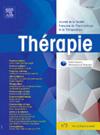Teaching pharmacovigilance to French medical students during the COVID-19 pandemic: Interest of distance learning clinical reasoning sessions
IF 2.2
4区 医学
Q3 PHARMACOLOGY & PHARMACY
引用次数: 0
Abstract
Background
Considering data from the literature in favor of active educational intervention to teach pharmacovigilance, we describe an innovative model of distance learning clinical reasoning sessions (CRS) of pharmacovigilance with 3rd year medical French students.
Methods
The three main objectives were to identify the elements necessary for the diagnosis of an adverse drug reaction, report an adverse drug reaction and perform drug causality assessment. The training was organized in 3 stages. First, students practiced clinical reasoning (CRS) by conducting fictive pharmacovigilance telehealth consultations. Second, students wrote a medical letter summarizing the telehealth consultation and analyzing the drug causality assessment. This letter was sent to the teacher for a graded evaluation. In the third stage was a debriefing course with all the students.
Results
Of the 293 third-year medical students enrolled in this course, 274 participated in the distance learning CRS. The evaluation received feedback from 195 students, with an average score of 8.85 out of 10. The qualitative evaluation had only positive feedback. The students appreciated the different format of the teaching, with the possibility to be active.
Conclusion
Through distance CRS of pharmacovigilance, medical students’ competences to identify and report adverse drug reactions were tested. The students experienced the pharmacovigilance skills necessary to detect adverse drug reactions in a manner directly relevant to patient care. The overall evaluation of the students is in favor of this type of method.
在 COVID-19 大流行期间向法国医科学生传授药物警戒知识:远程学习临床推理课程的趣味性
背景考虑到文献数据支持积极的教育干预来教授药物警戒,我们描述了一种创新的远程学习模式,即为三年级的法国医科学生开设药物警戒临床推理课程(CRS)。方法三个主要目标是确定诊断药物不良反应的必要因素、报告药物不良反应和进行药物因果关系评估。培训分三个阶段进行。首先,学生们通过进行虚构的药物警戒远程医疗咨询来练习临床推理(CRS)。其次,学生们撰写了一封医学信函,对远程健康咨询进行了总结,并对药物因果关系评估进行了分析。这封信被寄给教师,由教师进行分级评价。第三阶段是所有学生的汇报课程。结果 在该课程的 293 名三年级医学生中,有 274 人参加了远程学习 CRS。评估收到了 195 名学生的反馈,平均分为 8.85 分(满分 10 分)。定性评价只有正面反馈。结论通过远程药物警戒 CRS,检验了医学生识别和报告药物不良反应的能力。学生们体验到了以与病人护理直接相关的方式检测药物不良反应所需的药物警戒技能。学生们对这种方法的总体评价是赞成的。
本文章由计算机程序翻译,如有差异,请以英文原文为准。
求助全文
约1分钟内获得全文
求助全文
来源期刊

Therapie
医学-药学
CiteScore
3.50
自引率
7.70%
发文量
132
审稿时长
57 days
期刊介绍:
Thérapie is a peer-reviewed journal devoted to Clinical Pharmacology, Therapeutics, Pharmacokinetics, Pharmacovigilance, Addictovigilance, Social Pharmacology, Pharmacoepidemiology, Pharmacoeconomics and Evidence-Based-Medicine. Thérapie publishes in French or in English original articles, general reviews, letters to the editor reporting original findings, correspondence relating to articles or letters published in the Journal, short articles, editorials on up-to-date topics, Pharmacovigilance or Addictovigilance reports that follow the French "guidelines" concerning good practice in pharmacovigilance publications. The journal also publishes thematic issues on topical subject.
The journal is indexed in the main international data bases and notably in: Biosis Previews/Biological Abstracts, Embase/Excerpta Medica, Medline/Index Medicus, Science Citation Index.
 求助内容:
求助内容: 应助结果提醒方式:
应助结果提醒方式:


